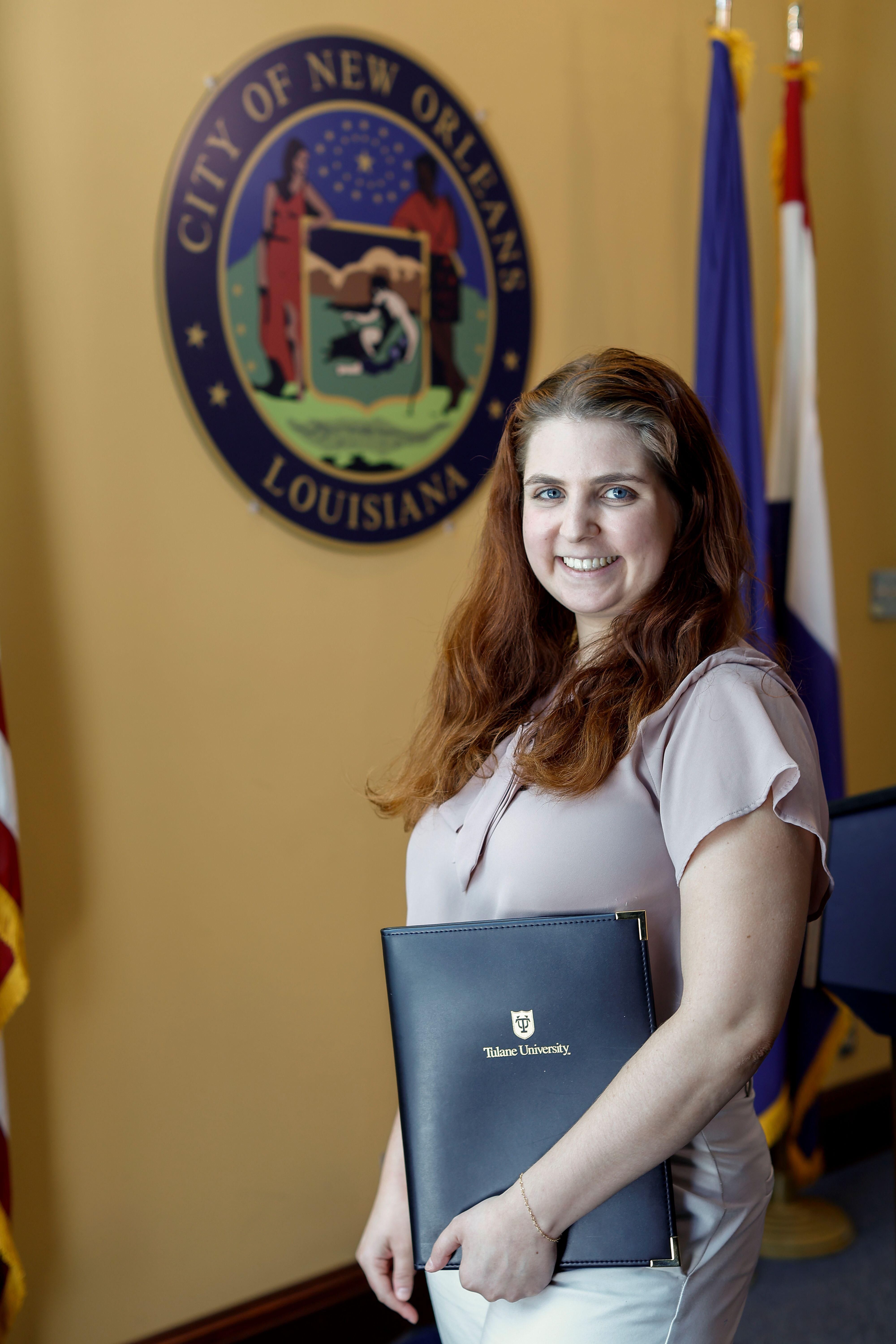Finding Harmony Between Social Work and Law
When Giulia Silver started her undergraduate career at the University of California, San Diego, she wanted to be a therapist. In fact – she says she applied to law school “on a whim.”
In her junior year, Silver interned with a therapist who had a large veteran clientele. After watching her work with the Veterans Affairs office to process insurance claims, her mentor recommended that she pursue a joint Master of Social Work (MSW) and Juris Doctor (JD).
After watching clients struggle with healthcare availability, Silver knew that she wanted to impact communities on a larger scale. “I wanted to do something bigger,” Silver says.
Currently, Silver is a Social Work Intern at the Mayor’s Office of Youth and Families, where she helps coordinate resources between youth-serving organizations that the City contracts with and the system-involved juveniles and families they service. With help from Tulane’s Field Education Department, Silver was able to secure a social work internship that overlaps with her interest in law.
Silver has also completed a law internship with the San Diego Public Defenders Office, which she says greatly informed her social work practice. “Jails are where you see every system interact,” Silver says.
“It’s really about breaking patterns. When young people interact with a system – any system, be it foster care, homelessness, or prison – they’re more likely to contribute to and participate in that system as adults. It’s important to intervene at a young age.” Silver says she wants to use her social work background to inform legal decisions.
How do the MSW and JD Degrees Work Together?
Silver says she likes the joint MSW/JD because the degrees build off one another. “I see social work as a problem-solving degree, just like law,” Silver says.
“They’re more similar than people think.” But there are still differences between the programs, according to Silver.
“You get to live in two different worlds – the logical law world and the compassionate social work world. That’s not to say that social workers can’t be logical and lawyers can’t be compassionate, but it’s important to understand both.”
JD vs. MSW: Which Career is Right For You?
Although she isn’t sure exactly what her future entails, she knows she will likely begin her career as a public defender. “I always thought of myself as more social work-oriented than law-oriented – and I still do,” Silver says. “In a sense, public defenders are social workers.”
At first, Silver wanted to use her JD to become a policymaker, but now she says she wants to work hands-on with communities. Her social work education has taught her that an imperialist system of law – in which policymakers make decisions for their constituents without consulting them first or heeding their feedback – will never work as well as an informed and democratic method.
“I think there’s something really interesting about creating change through community organizing,” Silver says. “I want to learn more about people and communities before changing laws.”
What Can You Do with an MSW and JD Dual Degree?
With a joint MSW/JD, you can work in either law or social work, or explore a specialized position that utilizes both.
“At pretty much any company you work for, there’s always going to be a lawyer and a social worker,” Silver says. “People don’t think about it, but both of these careers let you work in almost any field you’re interested in.”
With a Master of Social Work, graduates can explore careers in roles such as:
- Counselor Crisis
- Intervention Specialist
- Clinician
- Administrator
- Researcher
- Community Organizer
- Nonprofit Manager
- Educator
Typical roles for Juris Doctors include:
- Attorney/Lawyer
- Corporate Counsel
- Judicial Clerk
- Mediator/Arbitrator
- Policy Analyst/Advocate
- Human Resources Manager
- Risk Manager
How New Orleans’ Culture Enhances the Graduate Experience
Although the Law School campus is uptown, Silver has opted to live in the Central Business District (CBD), near the School of Social Work, for all four years of her program. “I would recommend it to anyone,” she says. “I know all the street names; I walk everywhere. I’m not from here, but this city makes me feel like a local.”
Silver recalls the conversations she has had in the grocery store and on the streetcar. “Everybody’s so kind and friendly here,” Silver says. “That has really changed my perspective. You learn from the population you work and live in.”
The inviting atmosphere and resilient community are some of the major reasons Silver loves New Orleans. They’re also what make New Orleans a great place to practice social work and an interesting place to learn law.
“New Orleans has taught me so much about community. People really come together to uplift each other here. I will definitely take that with me.”

